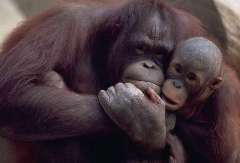Overview
 Order: Primates
Order: Primates
Family: Hominidae
Species: Bornean Orangutan (Pongo pygmaeus), Sumatran Orangutan (Pongo abelii), Tapanuli Orangutan (Pongo tapanuliensis)
IUCN Status: Critically Endangered
Population Trend: decreasing
Orangutan:
Bornean - Pongo pygmaeus
Sumatran - Pongo abelii
Distribution: restricted to the islands of Borneo, Malaysia and Sumatra, Indonesia.
Habitat: dense tropical rainforest.
Description: heavy, rather human-like body. Very long arms, grasping hands and feet. Dark grey skin and reddish hair.
Population and IUCN Red List Status:
Bornean - 45,000-69,000 - Endangered
Sumatran - 7,300- Critically Endangered
Size: Height: males 1.4 m, females 1.15 m.
Weight: males 90-120 kg, females 40-50 kg.
Life-span: estimated average of 35 years. 50 years or more in captivity.
Food: tropical fruits, leaves, shoots, bark, insects and eggs.
Read More: Introduction
